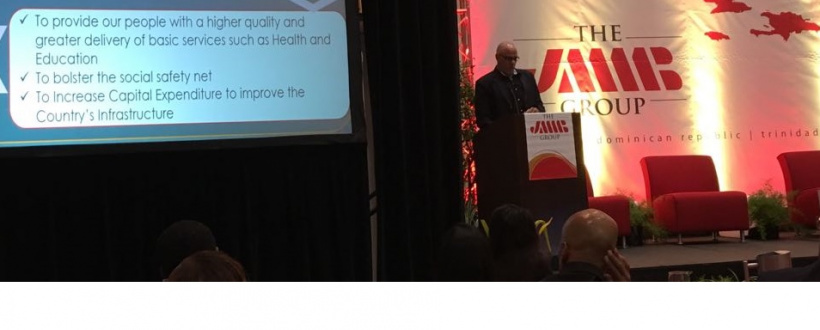The format was an animated presentation given by Keith Duncan on the Jamaica experience and lessons learned, followed by a panel discussion lead by of Dr. Marlene Attzs (Moderator), Ronald Hinds (President of the T&T Chamber of Industry and Commerce), Terrence Farrell (Chairman of T&T’s Economic Development Advisory Board), and Keith Duncan (Co-chairman of Jamaica’s Economic Programme Oversight Committee – EPOC).
Keith Duncan gave an overview of Jamaica’s economic woes explaining why they needed to turn to the IMF for funding. His presentation included a statistic driven account of the progress that Jamaica had made over the last year. Duncan highlighted their major priorities for economic growth, which included macro-economic stability, reduction in crime, a debt to GDP ratio of 60%, and maintaining comfortable NIR levels. Duncan indicated that Trinidad and Tobago’s economic position was salvageable; saying that our debt to GDP ratio was more favourable than Jamaica’s. He suggested that we should not wait until our backs were against the wall before choosing to act. Duncan explained that the key to Jamaica’s successful implementation of policies and fiscal measures was ongoing public consultation and community activity, this helped EPOC to gain buy-in from the population. Duncan also mentioned that there was public accountability and transparency for achieving pre-determined targets for economic progress, and the establishment of three independent oversight bodies aided with this – the Economic Growth Council (EGC), the Economic Programme Oversight Committee (EPOC), and the Public Sector Transformation Oversight Committee (PSTOC).
During Dr. Marlene Attzs’ opening remarks she made reference to Trinidad and Tobago’s current state of Economic Stillness. The panel discussion revolved around overcoming this. Dr. Terrence Farrell gave some compelling arguments for diversifying away from the Oil and Gas Sector. Farrell commented that “Lower for Longer” oil and gas prices, depleting natural gas reserves, and Trinidad’s high oil production price were all signals that our Nation’s dependence on the Energy Sector was not sustainable. Ronald Hinds supported Dr Farrell’s perspective. The discussion continued around the need to adjust our foreign exchange rate and reduce Trinidad and Tobago’s reliance on imports while increasing exports from other sectors. Dr Farrell alluded to seven alternate sectors with seven enablers that could assist in boosting the economy.
Questions and comments were taken from participants across the floor including Marla Dukharan (Chief Economist at Bitt Inc. and former Group Economist at RBC Caribbean), Howard Dottin (Programme Director at the Arthur Lok Jack Graduate School of Business), as well as a cross section of business leaders from various industries in the Private Sector. The majority of comments were in support of the panelists’ perspective. It is interesting to note that there were no decision makers from Government Ministries in attendance.



